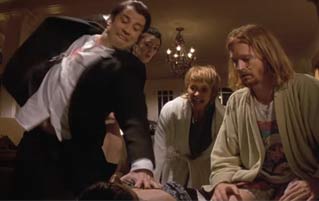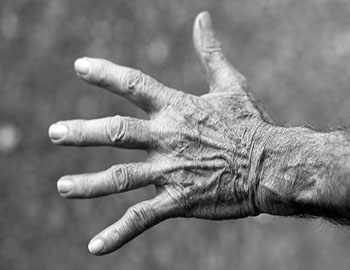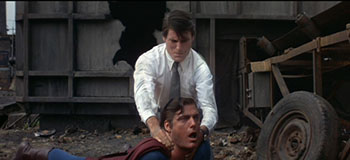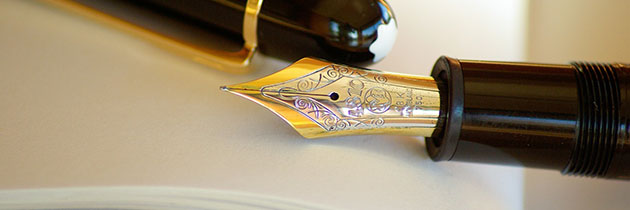5 Great Life Saving Tips From Films (That'll Get You Killed)

Movies can teach us many things, like how to save the rec center with a dance-off, and how to avoid velociraptors in a resort kitchen. But there are certain things that they probably shouldn't be dousing in artistic license: medicine, for instance. If I happen to collapse on the street, I'd like my rescuer to know something other than how to defibrillate me into a charcoal briquette after a properly dramatic "CLEAR!"
It gets even more terrifying when you consider the health care techniques that Hollywood clearly made up on an insane whim that have made it into the popular consciousness. We can forgive slight inaccuracies, but there's some scary woo-woo out there that, dun dun dunnnnn, could be the only thing that your future guardian angel knows.
Someone Having A Panic Attack? Slap The Shit Out Of Them

When someone stumbles into the hospital with a gunshot wound, the nurses don't start poking pens inside the bullet holes. When someone falls off a cliff, the rescue team doesn't sic the booze-carrying dog on them (he's a mean drunk). When someone starts suffering from a panic attack, bystanders don't all rush to assault them like that scene from Airplane!
Doing this would probably get you a C- on your med school exams.
Or do they? No ... but Hollywood thinks they do. As demonstrated in Night of the Living Dead, Buffy, and The Incredibles, screaming "Stay with me!" and slapping the living heck out of someone's face is a surefire way of saving them from falling into a fugue state. I disagree. At best, it's a poor substitute for qualified health care. At worst, your insurance company is going to copay each backhander and post-treatment squirt of hand-soothing moisturizer.

Panic isn't just a brief disruption of your mental faculties that can be erased with a forceful open palm -- it's a complex process involving a vast array of physiological and psychological problems, from "simply" feeling dizzy to chest pains, breathing difficulties, feelings of terror/loss of control, visual and auditory hallucinations, and imperviousness to pain. Assaulting this person is not a good idea and, worst case scenario, will end up with the hero, Clint Thrusthammer, rightfully getting mauled by the guy he was trying to save.
Where did this questionable technique hail from before Hollywood decided to adapt it as the end-all solution whenever a side character got too whiny? Actual old-timey medical advice that recommended, no shit, beating women out of hysterical episodes (a term that covered everything from toothache to sleepwalking to amnesia to chronic horniness). Those unfortunate enough to be diagnosed would be slapped, suffocated, near-waterboarded, and -- in one instance -- locked away to starve themselves into sanity. Psychology isn't perfect, but at least we've mostly come to the conclusion that torture does very little for relief.

Got A Split Personality Or Imaginary Friend? Tell Them To GTFO

When stretched to fill out a movie, screenwriters with no interest in meaningful character development will often just write their hero(es) as suffering from trauma or a destructive personality or some kind of imaginary friend. It's not hard to see why -- by including one of these subplots, they get to brag about how their superhero smash-epic has emotional depth, while the runtime of the movie expands as the robot-suited protagonist works out a way to punch their emotional pain to death.

In order to combat a self-destructive aspect of your personality in Hollywood movies, you have to wait until either a) it splits off into its own distinct physical form, or b) you learn how to venture into your own mind, at which point your good and evil sides fight in an arena. In both cases, you triumph (this is the movies, after all) and the harmful part of you dies and never, ever reappears. It's kinda like how movies think hacking involves exploring a literal representation of the innards of a motherboard, a procedure that would leave you with nothing but a useless applied computer science degree and a half-lobotomized Apple PowerBook.

Granted, we'd rather watch Batman punch out his problems than talk them out on a therapist's couch, so maybe we're the problem here ... and we're only an epiphany away from getting a karate chop from Bruce Wayne's mind. Hey, I'm only spitballing here. My knowledge of psychology is derived from Hollywood, after all. Who knows what rule set we're playing from? Next time I get depressed, I'm going to pummel my shadow until it apologizes.
In writing this guff, Hollywood is taking an otherwise abstract condition -- disassociative identity disorder (DPD) -- and applying a purely literal translation of its symptoms. Just imagine, for instance, the outcry if Outbreak had ended with Dustin Hoffman stopping the totally-not-ebola outbreak by shooting a gigantic blood blister. Also, the medical community still hasn't reached a consensus on what DPD is or how it can be treated. But the fix is probably not growling "You don't own me anymore" and spin-kicking your subconscious.

Got A Knife Or Arrow In You? Yank It Out

For someone who was raised on the mean streets of Stoke-on-Trent, I know surprisingly little about being stabbed. I'm not dumb enough to believe, however, that it's only a life-threatening condition if you have the knife inside you. Pulling the blade out doesn't kick-start some hitherto unknown healing ability that puts you on the mend and, god willing, gives you a valuable opportunity to stab the little shit who started the whole thing ... who'll then pull it out and continue this dance forever, like a Mobius strip made of razors.
In reality, you're going to die. And we don't mean much, much later while leaning peacefully against a tree with little to no pain -- it'll be in a blaze of agony because, hey, knives and arrows (another thing to watch out for if you ever find yourself in the plot of Deliverance) are designed specifically to be tricky bastards to remove without making things worse. In both instances, your flesh would have settled around the blade/arrowhead, thus making it impossible to remove without re-slicing yourself on the way out. Oh, and arrows make things doubly difficult by having barbs or a widened end that dig tightly into your wound if the arrow is being yanked out.

OK, so you drank a bunch of whiskey and pulled it out regardless? Good job; that whiskey'll relax you as you bleed to death, because you've just uncorked all that blood that was being held in by the projectile and the blood-clotting mechanism that we specifically evolved for this purpose.
According to legitimate medical professionals, you're actually supposed to put pressure on the wound, swaddle the projectile in clothing/bandages, and, if need be, remove as much of the shaft as possible so that it doesn't wibble and wobble around inside of you. This might just sound like bad sex advice, but keep it in mind for the next time you decide to pick a fight with a gang of aggressive LARPers.

Someone Stopped Breathing? Stab a Pen Through Their Throat

You know the scene I'm about to describe so vividly that, given the right amount of mind-altering substances, you'd swear that you'd carried it out yourself: Someone starts choking when, out of nowhere, a bystander appears, slices an opening in the patient's throat, and shoves a ballpoint pen inside the hole. The patient's life is saved, everyone starts crying, and you stand around feeling awkward because that was your favorite pen.
"I was using that to make dinne- oh, never mind."
First things first, the whole "slicing a throat open to insert a breathing pipe" is a real thing -- it's called a cricothyrotomy, and it can be an invaluable and life-saving tool when done in controlled circumstances. It's just rare for those controlled circumstances to involve having access to a shitload of stationery as opposed to, say, medical equipment.
In fact, academia is so sick of people trying to slit each other's throats at the merest hint of a chest cough that they performed an experiment with a fresh cadaver to assess how effective it actually is. The results weren't surprising. Of the ten medical students tasked with zombifying a corpse using only fresh air and writing implements, only one was successful ... after three attempts lasting a total of five minutes, by which time that pen would've been better served on the death certificate. The other nine, meanwhile, were unable to either penetrate the throat or insert the pen without causing major damage to the patient.
OK, but anyone could be that solitary success story, right? Nope. It's almost a matter of having the right ballpoint with you. If the pen's tube is wide, it'll bring sufficient air into the lungs, sure, but it'll also end up blocking the trachea entirely. If the tube is too small, however, it doesn't pose a choking threat, but it won't suffice in terms of airflow. It's a trade off between how you'd like to die, really: suffocation, throat mauling, or some well-meaning millennial trying the operation using a stylus.

Poisoned Or Overdosed On Drugs? Stab A Needle Into Your Heart

OK, I'm going to make a crazy suggestion, but try to stick with me: If a movie tells you to stab or unstab yourself with anything, it's a bad idea and should be disregarded immediately. You might find that patronizing, but I've seen a lot of you guys in the comments worrying about SJWs (serrated jugular weapons), and I just want to make sure we're on the same page. This advice goes double if you're stabbing yourself with anything containing medicine -- a la Pulp Fiction, The Rock, and Firefly -- because, holy shit, haven't you learned anything about Hollywood's dubious medical training?
Dr. Tarantino's stint as a surgeon was short and beautiful and left at least 12 dead.
Actually known as intercardiac injection, stabbing a needle into your heart used to be a popular medical procedure until the mid-'70s, when it turned out to be an incredibly dangerous way of doing something that our veins were already pretty good at (i.e., quickly dispersing medicine into your bloodstream). It works, sure, but it's the annoying-but-predictable side effect of stabbing a fucking hole into your heart (and lungs) that bothers most people. Call it a rebellion against this fast-paced world that we live in, but I'd rather take it through my veins and hold any potential resurrections for, like, the extra ten seconds.

There's also the fact that the main condition for which you'd need to stab a fucking needle into your heart -- cardiac arrest -- also requires you to perform CPR, a task that can't be done while you're waiting for some muppet with a needle to psych themselves up, aim, steady themselves, wuss out, re-psych themselves up, re-aim, re-steady themselves, stab the effing thing, pull out without breaking the needle, and pass out. It's lunacy. Essentially, just imagine how you'd feel if you took your child for their vaccinations and the doctors stabbed the shots into their chests. You'd explode with righteous fury and, if nothing else, become the new poster child for an anti-vaxxer movement that makes sense.
Follow Adam on Twitter!
To see more of how Hollywood has failed us, check out 8 Scenes That Prove Hollywood Doesn't Get Technology and 6 Famous Movie Scenes With Horrific Scientific Implications.
Subscribe to our YouTube and discover some harsh truths in 6 Everyday Products Hollywood Thinks Are Magic and watch other videos you won't see on the site!
Also follow us on Facebook. Y'all come back now, ya hear?
And to further expand your noggin, check out Cracked's De-Textbook: The Stuff You Didn't Know About the Stuff You Thought You Knew.
Through November 26, 2017, use Amazon promo code GIFTBOOK17 at checkout to get $5 of a printed book purchase of $20 or more! (excludes products sold by third-party sellers)
It's loaded with facts about history, your body, and the world around you that your teachers didn't want you to know. And as a bonus? We've also included the kinkiest sex acts ever described in the Bible.
